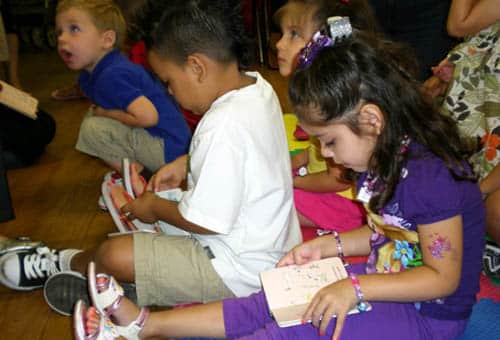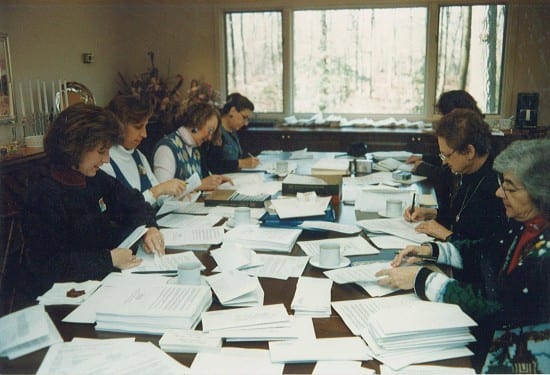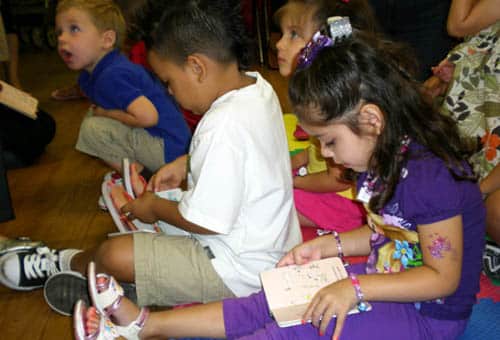
The Reading Connection: Promoting Literacy One Book at a Time
“Congratulations! I am pleased to inform you that The Reading Connection has been awarded a $350 small grant from Kars4Kids! Your mission to improve the lives of at-risk children by promoting literacy is beautiful, and we are honored to have a small part in making your programs possible.”
That was the note our Director of Public Relations, Wendy Kirwan, sent to the wonderful people at The Reading Connection (TRC), an organization dedicated to opening up the world of books to children. Nothing could be closer to our own mission at Kars4Kids of giving kids a helping hand to get ahead. Kars4Kids was happy to do its part to ensure kids have books to read.
TRC sends volunteers into shelters and community centers to read to at-risk children. The organization also sends children books to their homes, free of charge, to make sure that kids have real books to feel, see, and read, a critical facet of developing literacy skills. But the organization doesn’t stop there: TRC also gives workshops to families to teach parents how to foster a love of reading in their children. Family support workers are trained by TRC to teach families the importance of reading and to guide them in getting their children up to scratch on their reading.
Kars4Kids spoke to Judy Hijikata, Director of Communications at TRC, to find out more about the work of TRC, and to see what parents might do at home to help their children fall in love with the printed word.
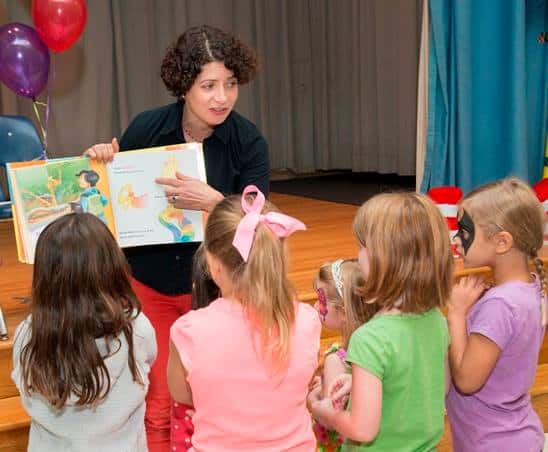
Kars4Kids: Tell us a bit about the history and mission of The Reading Connection. Who was your founder? How did The Reading Connection get started?
Judy Hijikata: The Reading Connection (TRC) was founded in 1989 by three Arlington, VA, elementary school reading teachers. They noticed that they were seeing kids with different needs in their classrooms, and realized the kids were living at a newly opened nearby shelter. The teachers began going to the shelter, on a volunteer basis, to spend time reading with the kids and giving them books. That very impulse—the importance of reading aloud with kids, and the power of offering that to kids under stress—has always been the heart of our program. One of the three teachers, Beth Reese, became TRC’s first executive director.
Here’s our mission statement:
The Reading Connection is dedicated to improving the lives of at-risk children and families by helping them create and sustain literacy-rich environments and motivation for reading. This mission is accomplished by
– Volunteers who read aloud to children at shelters and community centers,
– Donations that provide children with free, new books to keep,
– Workshops that help parents encourage reading and literacy development and
– Training for family support workers who promote the importance of reading. 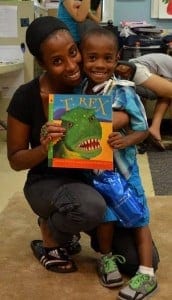
Kars4Kids: Tell us a bit about how TRC has evolved from its early days. I know you once worked closely with social services agencies to identify at-risk families who might benefit from what The Reading Connection offers. Is that still your focus? What constitutes an at-risk family?
Judy Hijikata: When we first began, in shelters, the families were in housing crisis. Now our largest programs are not in shelters but in affordable apartments, where the families are not in the same degree of housing insecurity. Rather they must meet income requirements to live in the affordable units, and for many, English is not the parents’ first language. For a variety of reasons, the children are at-risk for not reading on grade level by third grade, which is, as your readers might know, a predictor for high school graduation.
Kars4Kids: There’s lots of evidence that pre-literacy skills begin at home, even from birth. At what point in the child’s development does TRC get involved?
Judy Hijikata: Some Book Club moms order books while they are expecting! We love to see this because we know these moms understand the importance of sharing books with their kids from birth, and even before!
Kars4Kids: Tell us about TRC’s Read-Aloud program. How does this work? In how many places do you operate this program? How often does the program run? Must an adult accompany the child?
Judy Hijikata: The Read-Aloud program currently operates in 13 sites, which are either shelters or affordable apartment complexes. The children participating in the Read-Alouds are generally 4 to 11 years old. Each week, a team of volunteers comes in the early evening to spend an hour with the kids reading books on a selected theme; having conversations; doing a theme-related activity and helping the kids choose a free, new book to take with them. There are around 250 volunteers who help in this program, which runs in Alexandria, Arlington and Fairfax counties in Virginia, Washington, DC, and Montgomery County, MD.
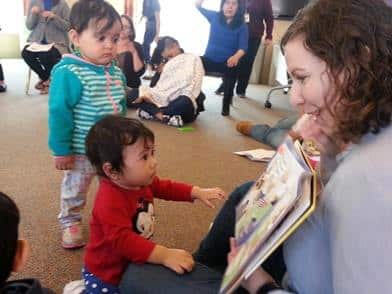
Kars4Kids: It’s awesome that the children get a choice of books—and we love that there’s a Margaret Wise Brown book on your toddler and preschoolers book list. How do you choose the books you offer? How often do you update your reading list How often do the children in the book club receive books by mail?
Judy Hijikata: Letting kids choose their books is a very important motivational factor, as you can imagine. Books are purchased for the Book Club (as opposed to books for the Read-Aloud, which come from community donations) and selected by knowledgeable TRC staffers with years of experience helping kids choose books in retail and library settings. In addition to years of experience, we are guided by industry reviews and by criteria we’ve developed. You’ll notice that approximately 1/3 of the books on the Book Club book list are bilingual English/Spanish. Many of the client families speak Spanish as their first language, and it is very important to provide moms and dads with books they feel comfortable reading.
The wish list on the website is updated every six months. The Book Club booklist is new each month. Kids in the Book Club receive books once a month. In each book order is an order form which they can use to order books for the next month’s mailing. Also included in the package are hints for parents on ways they can use the books they’ve ordered for conversation starters and/or skills development.
Book Club families are registered in the Book Club by the family support workers and home visiting staff of social service agencies. Kids registered range from newborn to 5 years of age. Siblings (from prenatal to 18) can also receive books through the Book Club.
Promoting Literacy: A Generational Thing
Kars4Kids: With just six permanent staff members, you must have a large pool of volunteers to handle the enormous amount of work you do: workshops, the Read-Aloud program, processing book orders and mailing out the books. How many volunteers are helping out at TRC? Where do you find your volunteers?
Judy Hijikata: TRC employs 4 full-time employees and 4 part-time employees. You’re right, we could not do it without our large and dedicated volunteer corps, which numbers nearly 300. The majority of these (250) are Read-Aloud volunteers, but we also benefit from the time and dedication of folks who help pack up the Book Club packages, lead Reading Family Workshops and help out in the office.
Kars4Kids: Does TRC envision expanding its services beyond the DC, Virginia, Maryland tri-state area?
Judy Hijikata: We do plan to expand over the next few years, but will stay within the DC metro area. Our Maryland presence is new—our Read-Aloud program opened there in 2014. In 2016, we plan to expand again in Montgomery County, MD, with another Read-Aloud site in March, followed by a new Book Club partner in June 2016. In 2017, we plan to expand further in Fairfax County, VA, with both the Read-Aloud and Book Club program. And every Book Club and Read-Aloud partner also receives Reading Families Workshops.
Kars4Kids: If you could give parents—not just parents of at-risk children, but all parents—just one piece of advice on fostering literacy skills in their children, what would it be?
Judy Hijikata: This is our mantra, first articulated in the 1985 study, Becoming a Nation of Readers. “The most important thing you can do to set your child up for future success in school is to read aloud to him or her.”
UPDATE: Sadly, The Reading Connection closed its doors in 2017, due to lack of funding. Please consider donating to our charity to help us support more youth development organizations.
